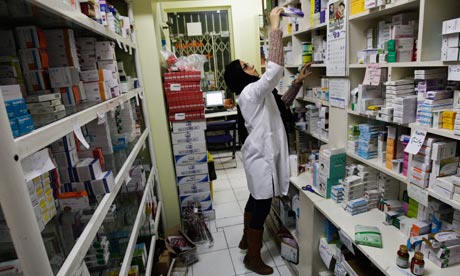EU-sanctions hit ordinary citizens in Iran

By Sara Rajabova
Although the West and U.S. claim the sanctions imposed on Iran over its nuclear programme targeted the country's economy, they mainly hit its ordinary citizens.
The imposed sanctions seriously hit the country's pharmaceutical sector. Although the United States and the European Union claim the sanctions did not directly targeted medicines imported in the country, one can observe what a crisis it caused in the Iranian pharmaceutical market, and how millions of ordinary Iranians with chronic health problems suffered as a result.
Given the importance of this sector, Tehran often condemns the EU for targeting the country's medical sector through unilateral embargoes imposed under the pretext of its nuclear energy program.
The U.S. and EU have both ensured that explicit exemptions and waivers have been inked into the sanctions legislation, but those exemptions are not working.
Iran's Foreign Ministry Spokesman Ramin Mehmanparast has recently stated that the EU has in practice prevented export of medicines, particularly vital medicines, to Iran, arguing that futility of earlier embargoes against Tehran has apparently prompted the bloc to resort to such indirect measures.
"The European Union cannot deny definite and unequivocal effects of its sanctions on the lives and health of the innocent Iranian citizens and shirk its responsibility for violating human rights of hundreds of patients in need of medicine," Mehmanparast said in response to recent statements by Michael Mann, the spokesman of EU Foreign Policy Chief Catherine Ashton, about the union's embargoes against Iran.
The main problem that Iran's medical sector faced is that restrictions on Iran's access to international banking networks obstacles to pay for imported medicine and equipment.
Iran's currency value plummeted after the imposition of new sanctions, which resulted in the worsening of the already high inflation rates.
Although the official exchange rate is about 12,000 rials per the dollar, the market rate is three times higher than official rate. The prices dictated by the government for medicines are based on the official rate plus a mark-up. Therefore, the pharmaceutical companies are able to buy imported drugs or chemical ingredients necessary for the production only in case of access to hard currency at the official rate.
The created situation mostly threatens patients with cancer, muscular dystrophy, amyotrophic lateral sclerosis (also known as motor neurone disease) and hemophiliac patients.
Earlier in October 2012, the US Treasury Department stated that the American companies are allowed to sell certain medicines and basic medical supplies to Iran without first seeking a license from the Office of Foreign Assets Control.
The decision came following Iran's protests that the US-engineered sanctions were hurting ordinary Iranian citizens and over fears that the humanitarian effects of the unilateral sanctions could undermine support for the bans among Washington's allies.
However, last week Press TV reported that the U.S. has launched an investigation into the transactions of Switzerland's biggest pharmaceutical company, Novartis, with Iran.
The Wall Street Journal also reported that Novartis argued in its 2012 annual report that its Alcon eye-care unit is being investigated by the United States for exporting medicine to Iran.
Iran tries to decrease the effect of these sanctions on its pharmaceutical market appealing to the international organizations. In this regard President of Academy of Medical Sciences Seyed Alireza Marandi has recently sent a second letter to UN Secretary General Ban Ki-moon, criticizing him for his silence and indifference to the threats directed at the health of Iranian people and urged him to show real action.
But, such appeals hardly can help Iran to stand strong before this situation, as the time goes against Iranian people.
In early 2012, the United States and the European Union imposed sanctions on Iran's oil and financial sectors with the goal of preventing other countries from purchasing Iranian oil and conducting transactions with the Central Bank of Iran.
Later in October, the EU foreign ministers reached an agreement on another round of sanctions against Iran.
The US-engineered sanctions were imposed based on the accusation that Iran is pursuing non-civilian objectives in its nuclear energy program.
However, Iran rejects the allegations, arguing that as a committed signatory to nuclear Non-Proliferation Treaty (NPT) and a member of International Atomic Energy Agency (IAEA), it has the right to use nuclear technology for peaceful purposes.
